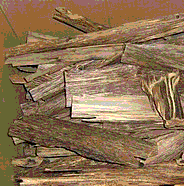Agarwood, aloeswood, eaglewood or gharuwood is a fragrant dark resinous wood used in incense, perfume, and small carvings. It is formed in the heartwood of aquilaria trees when they become infected with a type of mold (Phialophora parasitica). Prior to infection, the heartwood is odourless, relatively light and pale coloured; however, as the infection progresses, the tree produces a dark aromatic resin, called aloes (not to be confused with Aloe ferox, the succulent commonly known as the bitter aloe) or agar (not to be confused with the edible, algae-derived agar) as well as gaharu, jinko, oud, or oodh aguru (not to be confused with bukhoor), in response to the attack, which results in a very dense, dark, resin-embedded heartwood. The resin-embedded wood is valued in Indian–North Eastern culture for its distinctive fragrance, and thus is used for incense and perfumes.
Oud oil can be distilled from agar wood using steam; the total yield of oil for 70 kg of wood will not exceed 20 ml.
Agarwood is listed in Appendix 2 of CITES

